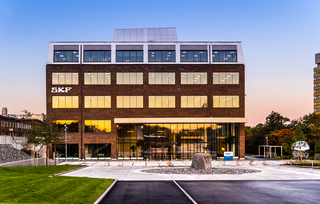
AB SKF is a Swedish bearing and seal manufacturing company founded in Gothenburg, Sweden, in 1907. The company manufactures and supplies bearings, seals, lubrication and lubrication systems, maintenance products, mechatronics products, power transmission products, condition monitoring systems and related services globally.
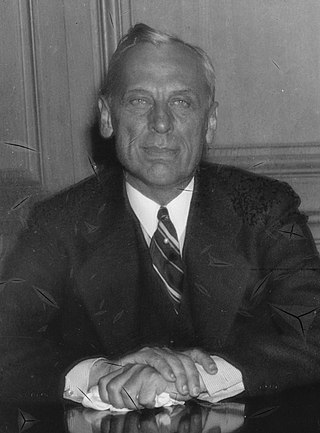
Alfred Pritchard Sloan Jr. was an American business executive in the automotive industry. He was a long-time president, chairman and CEO of General Motors Corporation. Sloan, first as a senior executive and later as the head of the organization, helped GM grow from the 1920s through the 1950s, decades when concepts such as the annual model change, brand architecture, industrial engineering, automotive design (styling), and planned obsolescence transformed the industry, and when the industry changed lifestyles and the built environment in America and throughout the world.
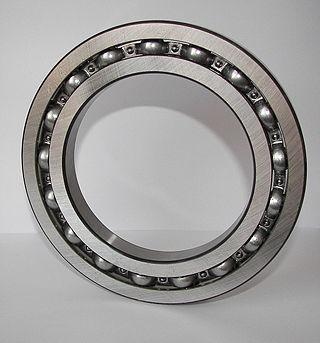
A bearing is a machine element that constrains relative motion to only the desired motion, and reduces friction between moving parts. The design of the bearing may, for example, provide for free linear movement of the moving part or for free rotation around a fixed axis; or, it may prevent a motion by controlling the vectors of normal forces that bear on the moving parts. Most bearings facilitate the desired motion by minimizing friction. Bearings are classified broadly according to the type of operation, the motions allowed, or to the directions of the loads (forces) applied to the parts.
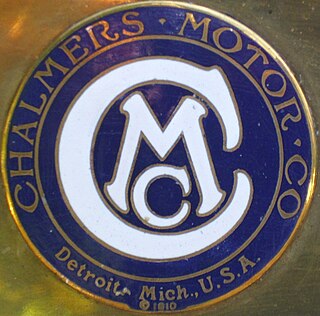
Chalmers Motor Company was an American car company headquartered in Detroit, Michigan. The company started in 1908 and continued producing high-end vehicles until 1923, when it merged with Maxwell forming the basis for the Chrysler Corporation.

William Crapo Durant was a leading pioneer of the United States automobile industry and co-founder of General Motors and Chevrolet. He created a system in which a company held multiple marques – each seemingly independent, with different automobile lines – bound under a unified corporate holding company. Durant, along with Frederic L. Smith, co-founded General Motors, as well as Chevrolet with Louis Chevrolet. He also founded Frigidaire.

Henry Martyn Leland was an American machinist, inventor, engineer and automotive entrepreneur. He founded the two premier American luxury automotive marques, Cadillac and Lincoln.

In mechanical engineering, a rolling-element bearing, also known as a rolling bearing, is a bearing which carries a load by placing rolling elements between two concentric, grooved rings called races. The relative motion of the races causes the rolling elements to roll with very little rolling resistance and with little sliding.
The Timken Company is a global manufacturer of bearings and power transmission products. Timken operates from 42 countries.

A thrust bearing is a particular type of rotary bearing. Like other bearings they permanently rotate between parts, but they are designed to support a predominantly axial load.

John Wesley Hyatt was an American inventor. He is mainly known for simplifying the production of celluloid.
Federal-Mogul Corporation is an American developer, manufacturer and supplier of products for automotive, commercial, aerospace, marine, rail and off-road vehicles; and industrial, agricultural and power-generation applications. It was acquired in February 2022 by Apollo Global Management.
The Timken Roller Bearing Company was one of the first to introduce roller bearings for railroad cars. Railroad cars owned and operated by the Atchison, Topeka and Santa Fe Railway were some of the first to use roller bearings rather than "oil waste journal" boxes. Henry Timken, a German immigrant, invented an improved bearing and founded the company in 1899. It was later renamed The Timken Company.

Tapered roller bearings are rolling element bearings that can support axial forces as well as radial forces.
Pope Manufacturing Company was founded by Albert Augustus Pope around 1876 in Boston, Massachusetts, US and incorporated in Hartford, Connecticut in 1877. Manufacturing of bicycles began in 1878 in Hartford at the Weed Sewing Machine Company factory. Pope manufactured bicycles, motorcycles, and automobiles. From 1905 to 1913, Pope gradually consolidated manufacturing to the Westfield Mass plant. The main offices remained in Hartford. It ceased automobile production in 1915 and ceased motorcycle production in 1918. The company subsequently underwent a variety of changes in form, name and product lines through the intervening years. To this day, bicycles continue to be sold under the Columbia brand.

The history of General Motors (GM), one of the world's largest car and truck manufacturers, dates back more than a century and involves a vast scope of industrial activity around the world, mostly focused on motorized transportation and the engineering and manufacturing that make it possible. Founded in 1908 as a holding company in Flint, Michigan, as of 2012 it employed approximately 209,000 people around the world. With global headquarters at the Renaissance Center in Detroit, Michigan, United States, General Motors manufactures cars and trucks in 35 countries. In 2008, 8.35 million GM cars and trucks were sold globally under various brands. Current auto brands are Buick, Cadillac, Chevrolet, GMC, and Wuling. Former GM automotive brands include La Salle, McLaughlin, Oakland, Oldsmobile, Opel, Pontiac, Hummer, Saab, Saturn, Vauxhall, Daewoo and Holden.

Lincoln Industrial Corporation (Lincoln) is a manufacturer of automated lubrication systems, manual lubrication equipment and industrial pumping systems, and subsidiary of Svenska Kullagerfabriken AB (SKF). Founded in 1910, the company has been responsible for many of the inventions that established modern lubrication practices in automotive maintenance and industry.
ACDelco is an American automotive parts brand owned by General Motors (GM). Factory parts for vehicles manufactured by GM are consolidated under the ACDelco brand, which also offers aftermarket parts for non-GM vehicles. Over its long history it has been known by various names such as United Motors Corporation, United Motors Service, and United Delco. The brand "ACDelco" should not be confused with GM's former AC Delco Systems, formed in 1994 from the merger of AC Rochester Division and Delco Remy Division. In 1995 Delphi Automotive Systems absorbed AC Delco Systems.
Harrison Radiator Corporation was an early manufacturer of automotive radiators and heat exchangers for crewed spacecraft and guided missiles, as well as various cooling equipment for automotive, marine, industrial, nuclear, and aerospace applications, that became a division of General Motors in 1918. Today its business is a part of General Motors' Automotive Components Group, and is based in Lockport, Niagara County, New York.
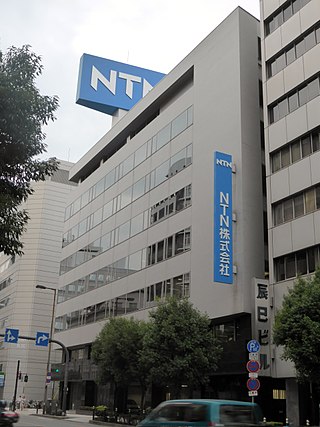
NTN Corporation is one of the most prominent manufacturers of bearings in Japan, second domestically only to NSK Ltd. The company is one of the largest exporters worldwide of friction-reducing products such as constant-velocity joints.
Lewis Rasmus Heim was an American machinist and businessman who was the inventor of the Centerless Cylindrical Grinder, the Heim Joint Rod End Bearing and a pioneer of modern spherical, ball and roller bearings.
















